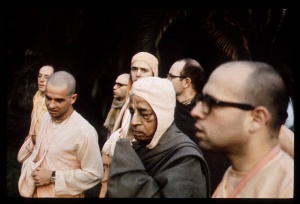CC Antya 3.31: Difference between revisions
m (1 revision(s)) |
No edit summary |
||
| Line 1: | Line 1: | ||
{{ | [[Category:Sri Caitanya-caritamrta - Antya-lila Chapter 03|C031]] | ||
<div style="float:left">'''[[Sri Caitanya-caritamrta|Śrī Caitanya-caritāmṛta]] - [[CC Antya|Antya-līlā]] - [[CC Antya 3|Chapter 3: The Glories of Śrīla Haridāsa Ṭhākura]]'''</div> | |||
<div style="float:right">[[File:Go-previous.png|link=CC Antya 3.30|Antya-līlā 3.30]] '''[[CC Antya 3.30|Antya-līlā 3.30]] - [[CC Antya 3.32|Antya-līlā 3.32]]''' [[File:Go-next.png|link=CC Antya 3.32|Antya-līlā 3.32]]</div> | |||
{{CompareVersions|CC|Antya 3.31|CC 1975|CC 1996}} | |||
{{RandomImage}} | |||
==== TEXT 31 ==== | ==== TEXT 31 ==== | ||
<div class="verse"> | |||
<div | :bhojana kariye āmi, tumi tāhā jāna | ||
bhojana kariye āmi, tumi tāhā jāna | :bāhya virahe tāhā svapna kari māna | ||
bāhya virahe tāhā svapna kari māna | |||
</div> | </div> | ||
| Line 13: | Line 16: | ||
==== SYNONYMS ==== | ==== SYNONYMS ==== | ||
<div class="synonyms"> | |||
<div | ''bhojana''—dining; ''kariye''—do; ''āmi''—I; ''tumi''—you; ''tāhā''—that; ''jāna''—know; ''bāhya''—externally; ''virahe''—in separation; ''tāhā''—that; ''svapna''—dream; ''kari''—as; ''māna''—you accept. | ||
</div> | </div> | ||
| Line 21: | Line 23: | ||
==== TRANSLATION ==== | ==== TRANSLATION ==== | ||
<div class="translation"> | |||
<div | |||
“‘You know that I come and eat the offerings, but because of external separation, you consider this a dream. | “‘You know that I come and eat the offerings, but because of external separation, you consider this a dream. | ||
</div> | </div> | ||
| Line 29: | Line 30: | ||
==== PURPORT ==== | ==== PURPORT ==== | ||
<div class="purport"> | |||
<div | Because mother Śacī was feeling separation from Śrī Caitanya Mahāprabhu, she thought she was dreaming that her son had come to her. Śrī Caitanya Mahāprabhu, however, wanted to inform her that actually it was not a dream. He actually came there and ate whatever His mother offered Him. Such are the dealings of advanced devotees with the Supreme Personality of Godhead. As stated in the ''Brahma-saṁhitā'' (BS 5.38): | ||
Because mother Śacī was feeling separation from Śrī Caitanya Mahāprabhu, she thought she was dreaming that her son had come to her. Śrī Caitanya Mahāprabhu, however, wanted to inform her that actually it was not a dream. He actually came there and ate whatever His mother offered Him. Such are the dealings of advanced devotees with the Supreme Personality of Godhead. As stated in the Brahma-saṁhitā ( | |||
:premāñjana-cchurita-bhakti-vilocanena | :''premāñjana-cchurita-bhakti-vilocanena'' | ||
:santaḥ sadaiva hṛdayeṣu vilokayanti | :''santaḥ sadaiva hṛdayeṣu vilokayanti'' | ||
:yaṁ śyāmasundaram acintya-guṇa-svarūpaṁ | :''yaṁ śyāmasundaram acintya-guṇa-svarūpaṁ'' | ||
:govindam ādi-puruṣaṁ tam ahaṁ bhajāmi | :''govindam ādi-puruṣaṁ tam ahaṁ bhajāmi'' | ||
“I worship the primeval Lord, Govinda, who is always seen by the devotee whose eyes are anointed with the pulp of love. He is seen in His eternal form of Śyāmasundara, situated within the heart of the devotee.” Pure devotees realize dealings with the Lord on the transcendental plane, but because the devotees are still in the material world, they think that these are dreams. The Lord, however, talks with the advanced devotee, and the advanced devotee also sees Him. It is all factual; it is not a dream. | “I worship the primeval Lord, Govinda, who is always seen by the devotee whose eyes are anointed with the pulp of love. He is seen in His eternal form of Śyāmasundara, situated within the heart of the devotee.” Pure devotees realize dealings with the Lord on the transcendental plane, but because the devotees are still in the material world, they think that these are dreams. The Lord, however, talks with the advanced devotee, and the advanced devotee also sees Him. It is all factual; it is not a dream. | ||
</div> | </div> | ||
__NOTOC__ | |||
<div style="float:right; clear:both;">[[File:Go-previous.png|link=CC Antya 3.30|Antya-līlā 3.30]] '''[[CC Antya 3.30|Antya-līlā 3.30]] - [[CC Antya 3.32|Antya-līlā 3.32]]''' [[File:Go-next.png|link=CC Antya 3.32|Antya-līlā 3.32]]</div> | |||
__NOTOC__ | |||
__NOEDITSECTION__ | |||
Revision as of 17:00, 24 September 2021

A.C. Bhaktivedanta Swami Prabhupada
TEXT 31
- bhojana kariye āmi, tumi tāhā jāna
- bāhya virahe tāhā svapna kari māna
SYNONYMS
bhojana—dining; kariye—do; āmi—I; tumi—you; tāhā—that; jāna—know; bāhya—externally; virahe—in separation; tāhā—that; svapna—dream; kari—as; māna—you accept.
TRANSLATION
“‘You know that I come and eat the offerings, but because of external separation, you consider this a dream.
PURPORT
Because mother Śacī was feeling separation from Śrī Caitanya Mahāprabhu, she thought she was dreaming that her son had come to her. Śrī Caitanya Mahāprabhu, however, wanted to inform her that actually it was not a dream. He actually came there and ate whatever His mother offered Him. Such are the dealings of advanced devotees with the Supreme Personality of Godhead. As stated in the Brahma-saṁhitā (BS 5.38):
- premāñjana-cchurita-bhakti-vilocanena
- santaḥ sadaiva hṛdayeṣu vilokayanti
- yaṁ śyāmasundaram acintya-guṇa-svarūpaṁ
- govindam ādi-puruṣaṁ tam ahaṁ bhajāmi
“I worship the primeval Lord, Govinda, who is always seen by the devotee whose eyes are anointed with the pulp of love. He is seen in His eternal form of Śyāmasundara, situated within the heart of the devotee.” Pure devotees realize dealings with the Lord on the transcendental plane, but because the devotees are still in the material world, they think that these are dreams. The Lord, however, talks with the advanced devotee, and the advanced devotee also sees Him. It is all factual; it is not a dream.